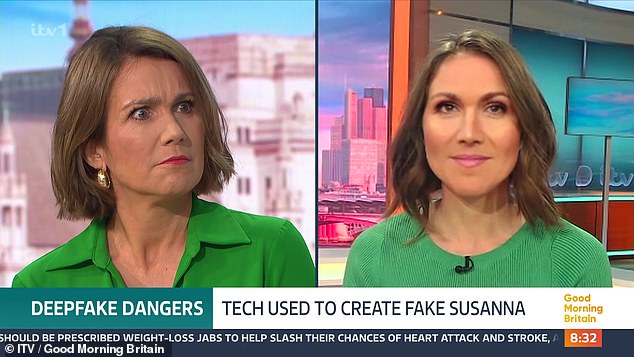Susanna Reid recently appeared shocked on Good Morning Britain when her likeness was used in a deepfake demonstration. The presenter, along with co-host Ed Balls, was joined by fraud expert Simon Horsewell and Laura Noye from tech company Onfido to discuss the rise in deep-fake AI scams. With just one photo, a deepfake filter was created to mimic Susanna’s likeness on Laura’s face, causing concerns about potential scams targeting her loved ones. Simon explained how scammers are using AI deep fake software to replicate faces and voices to access personal information and create fake documents, such as passports and driver’s licenses.
Simon demonstrated the technology by showing a deepfake filter on Laura’s face, resembling Susanna’s likeness, which raised worries about the quality of the deep-fake. He explained how easy it was to place someone’s face on a document with just a single photo, highlighting the potential dangers of identity fraud. Ed Balls expressed surprise at the lack of government communication about such issues, emphasizing the importance of raising awareness on identity fraud. The use of deepfake technology to create pornographic content featuring celebrities has also been a growing concern, with Channel 4 revealing that over 250 British celebrities, including Channel 4 newsreader Cathy Newman, have been victims of deepfake pornography.
The Online Safety Act criminalizes the sharing or threat of sharing deepfake intimate images without consent, but does not criminalize the creation of such content. This highlights the need for stricter legislation and enforcement to address the misuse of deepfake technology. Recently, Susanna Reid made a blunder on GMB when she failed to mention the upcoming tour of musical duo Boyzlife, Keith and Brian, during an interview. The hosts shared a throwback clip of Richard interviewing Boyzone, leading to a premature ending of the interview without mentioning the tour. Boyzlife jokingly pointed out the oversight, attributing it to the early morning timing of the show, revealing a light-hearted moment amidst discussions of serious issues related to deep fake technology and potential scams.
Deepfake technology poses significant risks, enabling scammers to impersonate individuals for fraudulent activities. The ease with which a deepfake filter can be created using just a single photo emphasizes the importance of safeguarding personal information and raising awareness about identity fraud. The lack of government communication on deepfake issues underscores the need for increased awareness and regulation to address the growing threat of deepfake scams. As the prevalence of deepfake technology continues to increase, there is a critical need for stricter legislation to protect individuals from potential harm and misuse of their personal information. The intersection of technology and fraud highlights the challenges of combating sophisticated scams in the digital age, requiring a proactive approach to safeguard against deepfake threats.


